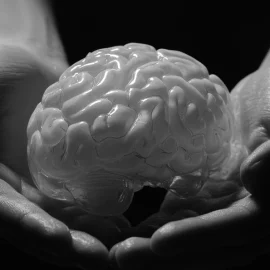
What effects can music have on those with cognitive decline? Why is music processed differently than other memories?
According to Daniel J. Levitin in I Heard There Was a Secret Chord, music and memory are closely linked. This is because the brain processes music memories differently than typical memories.
Here’s why music can be helpful for those with cognitive decline, such as dementia.
Music for Cognitive Decline
Cognitive decline encompasses conditions that affect memory and mental function, from mild age-related changes to severe dementia, which impacts over 55 million people worldwide. These conditions can make everyday tasks difficult and often force people to depend on others for help with basic needs like cooking, managing money, and remembering important information.
(Shortform note: Age is the primary risk factor for cognitive decline, as natural cellular aging processes gradually affect brain function over time. Our brains experience physical changes including shrinking volume, reduced blood flow, and inflammation that impact memory and thinking skills as we age. Fortunately, while you can’t control aging or genetics, research shows that regular mental and physical activity can help protect brain function. Simple daily habits like exercise, staying socially connected, and challenging your mind can significantly reduce cognitive decline risk, even with genetic predispositions or advancing age.)
According to Levitin, music therapy is an effective treatment for cognitive decline because the brain’s specialized musical processing networks often remain intact even as other cognitive functions decline. Unlike typical memories that depend on recalling specific details, musical memories are encoded through pattern recognition, making them more resistant to deterioration. This explains why many people with advanced dementia, who may no longer recognize family members or remember recent events, can still sing entire songs from their past with remarkable accuracy.
(Shortform note: In Musicophilia, neurologist Oliver Sacks explores how music engages the brain beyond just pattern recognition, tapping into deep emotional networks. He presents the case of Clive Wearing, a musician with severe amnesia who could only maintain conscious memory for about 30 seconds. While Wearing couldn’t remember basic daily events or recognize people he’d just met, he could still play Bach perfectly and conduct choirs with full emotional expression. Cases like Wearing’s led Sacks to develop his concept of “emotional-autobiographical memory”—the idea that music creates a sort of emotional timestamp in our brains that persists even when conventional memories fade.)
Levitin explains how music therapy helps address cognitive decline through multiple mechanisms:
First, when people with dementia engage with familiar music, it stimulates the release of dopamine, reducing agitation and anxiety. The songs can also serve as memory anchors, helping people access associated memories from their past. (Shortform note: Music can also unlock preserved muscle memory, as seen when Marta C. González Saldaña, a former ballerina with Alzheimer’s dementia, began dancing along to Tchaikovsky’s “Swan Lake,” recreating choreography she had performed decades before. Since muscle memories are stored separately from declarative memories and persist longer during cognitive decline, music can momentarily reconnect people to otherwise lost abilities and identities.)
Second, for those recovering from strokes or other brain injuries, music therapy supports speech recovery by engaging multiple neural networks simultaneously. (Shortform note: Melodic Intonation Therapy (MIT) helps stroke patients speak again by bypassing the damaged parts of the brain. Many stroke patients who can’t talk can still sing because these abilities rely on different brain regions. MIT uses simple melodies and rhythmic tapping to prompt the healthy musical side of the brain (right side) to take over some jobs from the damaged speech side (left side). Patients practice “singing” everyday phrases, gradually rebuilding their ability to communicate normally.)
Finally, and perhaps most importantly, shared musical experiences create meaningful moments of connection between people with cognitive decline and their loved ones, helping maintain emotional bonds even as other forms of communication become challenging. (Shortform note: Studies have found that while familiar music can create meaningful moments between patients and loved ones, it doesn’t necessarily help people with advanced cognitive decline recognize people, even if the music is linked to shared memories.)
These benefits have led many care facilities to implement personalized music programs, where residents listen to curated playlists throughout the day. Research has demonstrated that this approach significantly reduces anxiety while helping people maintain connections to their memories and relationships.
(Shortform note: A 2022 study found that personalized music intervention not only improved quality of life for patients, but for their caregivers as well. Caregivers reported feeling less overwhelmed, and the music sessions and personalized playlists fostered stronger connections between caregivers and patients. The research demonstrated how music can serve as a powerful tool for relationship-building and enhance the well-being of those taking care of loved ones who experience cognitive decline.)






